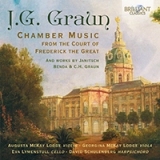Diese Musik aus Berlin stammt aus der Zeit des Übergangs vom Barock zur Klassik. Dreisätzige Trio-Sonaten sind das Muster, in dem die Viola als neues Melodieinstrument Eigenständigkeit erhält. Gleichzeitig entwickelte sich in der Zeit eine Öffnung der Konzertmöglichkeiten in Richtung auf ein nicht adliges Publikum.
Von vier eng mit diesem Kontext verbundenen Komponisten, Johann Gottlieb Graun als Konzertmeister und sein Bruder als Stellvertreter, Benda als Lieblingssolist sowie dem Kammermusiker Janitsch, stammen die hier vorgestellten Werke.
Die Schwestern Augusta und Georgina McKay Lodge haben hier die die führenden Partien für Geige bzw. Bratsche übernommen. Sie werden von Eva Lymenstull, Cello, und David Schulenberg, Cembalo, unterstützt. Alle sind langjährig in der historisch informierten Szene aktive Musiker. Dabei gelingt es ihnen, diese neue Ausrichtung in der Ausprägung der Musik mit ihren galant und sorgfältig angelegten Interpretationen hörbar zu machen. Der Cellistin gebührt in der Sonate von Carl Heinrich Graun besondere Aufmerksamkeit, da dieses Werk für das Cello solo nebst Cembalo komponiert wurde.
This music from Berlin dates from the period of transition from Baroque to Classical. Three-movement trio sonatas are the pattern in which the viola gains independence as a new melodic instrument. At the same time, the period saw the development of an opening of concert possibilities towards a non-aristocratic audience.
The works presented here are by four composers closely associated with this context, Johann Gottlieb Graun as concertmaster and his brother as deputy, Benda as favorite soloist, and the chamber musician Janitsch.
Sisters Augusta and Georgina McKay Lodge have taken the leading parts here for violin and viola, respectively. They are joined by Eva Lymenstull, cello, and David Schulenberg, harpsichord. All are longtime active musicians on the historically informed scene. In doing so, they succeed in making this new direction in the expression of the music audible with their gallant and carefully laid out interpretations. The cellist deserves special attention in the sonata by Carl Heinrich Graun, since this work was composed for the cello solo together with the harpsichord.
























